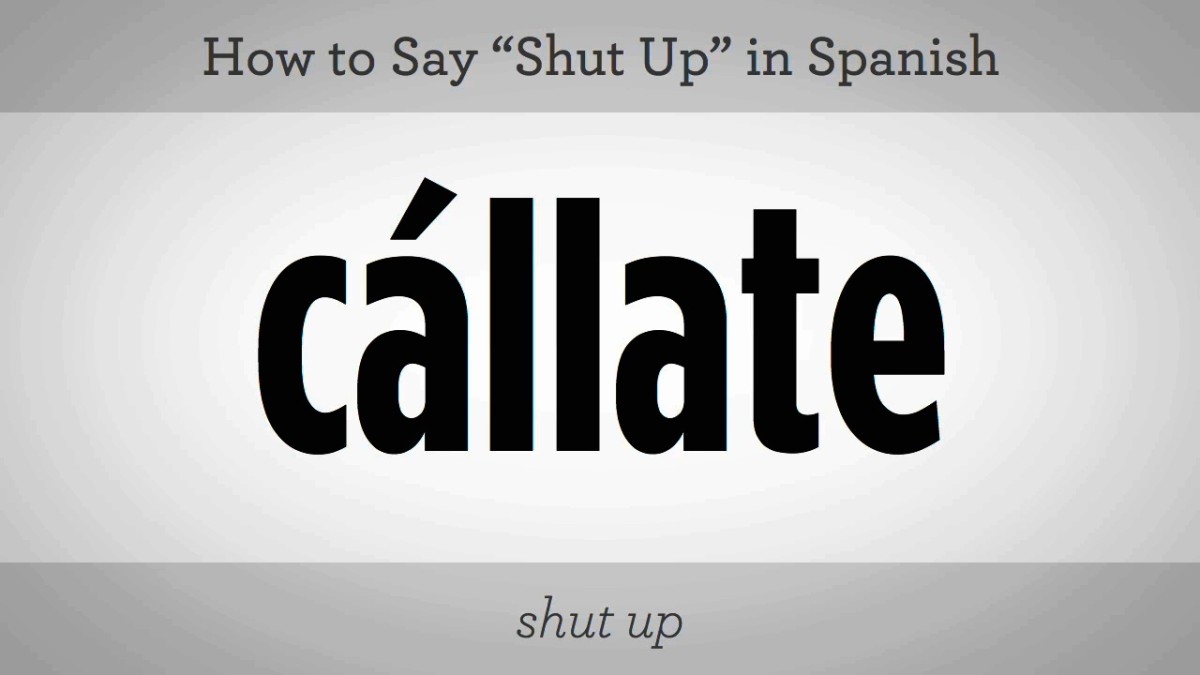Learning how to say shut up in Spanish might seem like a simple task, but there's more to it than meets the eye. Spanish is a rich and expressive language, and knowing the right words and phrases can make a world of difference in your communication. Whether you're traveling, studying, or simply expanding your linguistic skills, mastering this phrase is essential. So, let's dive in and explore the nuances of saying shut up in Spanish.
Have you ever found yourself in a situation where you wanted to express frustration or silence someone, but didn't know how to do it in Spanish? Don't worry, you're not alone. Many language learners struggle with finding the right words for such expressions. That's why we've created this guide to help you navigate the tricky waters of Spanish slang and formal expressions.
Before we get into the nitty-gritty, it's important to understand that context matters. The way you say shut up in Spanish can vary depending on the situation, the relationship between speakers, and the level of formality required. So, whether you're looking for polite expressions or something more direct, we've got you covered.
Read also:Drunk National Anthem A Controversial Melody Thatrsquos Got Everyone Talking
Why Knowing How to Say Shut Up in Spanish Matters
When you're learning a new language, understanding how to express emotions and assert boundaries is crucial. Knowing how to say shut up in Spanish can help you communicate effectively in various scenarios. Whether you're dealing with a noisy neighbor, an overly talkative colleague, or simply trying to maintain peace in a busy environment, having the right words at your disposal is invaluable.
Understanding the Cultural Nuances
Spanish-speaking countries have diverse cultures, and the way people express themselves can differ significantly. In some regions, direct expressions might be perfectly acceptable, while in others, they could be considered rude. For example, in Spain, you might hear phrases like "cállate," which is straightforward and commonly used. In Latin America, however, people might prefer softer alternatives to avoid offending others.
- In Spain: "Cállate" is widely used and understood.
- In Mexico: "Chsss" or "Silencio" might be more appropriate in formal settings.
- In Argentina: "Callate" is informal but commonly used among friends.
Common Phrases to Say Shut Up in Spanish
Let's explore some of the most common phrases used to express "shut up" in Spanish. Remember, the tone and context play a significant role in how these phrases are perceived. Here are a few examples:
1. Cállate
This is perhaps the most straightforward way to say shut up in Spanish. "Cállate" literally means "be quiet" and is widely used across Spanish-speaking countries. While it's direct, it can come across as harsh if not used in the right context.
2. Silencio
If you're looking for a more formal or polite way to ask someone to be quiet, "silencio" is your best bet. This phrase is often used in public settings, such as libraries or theaters, to maintain order and respect.
3. Callate
Similar to "cállate," "callate" is an informal way to tell someone to be quiet. It's commonly used among friends or in casual conversations but might not be suitable for formal situations.
Read also:Tell Your Girlfriend Lyrics A Deep Dive Into The Song Thatrsquos Got Everyone Talking
When to Use Formal vs. Informal Expressions
Choosing the right expression depends on the setting and the relationship between the speakers. Here's a quick guide to help you decide:
- Use "cállate" or "callate" with friends or in casual settings.
- Use "silencio" in formal or public environments.
- Avoid using direct expressions with strangers or in professional settings unless absolutely necessary.
Mastering the Pronunciation
Pronunciation is key when learning any new language. Mispronouncing words can lead to misunderstandings or even unintended offense. Here's how you can pronounce the phrases correctly:
- "Cállate": Pronounced as "kah-lyah-teh."
- "Silencio": Pronounced as "see-len-see-oh."
- "Callate": Pronounced as "kah-lyah-teh" (similar to "cállate").
Tips for Perfecting Your Pronunciation
To ensure you're pronouncing these phrases correctly, try the following tips:
- Listen to native speakers and mimic their intonation.
- Use language apps or online resources to practice pronunciation.
- Record yourself speaking and compare it to native speakers.
Exploring Regional Variations
Spanish is spoken in over 20 countries, and each region has its own unique way of expressing ideas. Let's take a closer look at some regional variations for saying shut up in Spanish:
1. Spain
In Spain, "cállate" is the go-to phrase for telling someone to be quiet. It's direct and commonly used in everyday conversations.
2. Mexico
Mexicans often use "chsss" as a softer alternative to "cállate." This onomatopoeic sound mimics the act of shushing someone and is less confrontational.
3. Argentina
Argentinians prefer "callate," which is informal but widely accepted among friends. In more formal settings, they might opt for "silencio."
Using Slang and Idioms
Slang and idioms can add color and authenticity to your conversations. Here are a few examples of slang expressions for saying shut up in Spanish:
- "Cierra la boca" – Literally means "close your mouth," but it's a more direct way of telling someone to be quiet.
- "Tapa bocas" – A playful way of saying "shut up" often used among friends.
- "Chsss" – A universal shushing sound used in various Spanish-speaking countries.
When to Use Slang
Slang is best used in informal settings with people you know well. Avoid using it in professional or formal environments unless you're certain it's appropriate.
Practicing with Real-Life Scenarios
To truly master how to say shut up in Spanish, practice using the phrases in real-life situations. Here are a few scenarios to help you get started:
- Scenario 1: You're at a library, and someone is talking loudly. Use "silencio" to politely ask them to quiet down.
- Scenario 2: You're hanging out with friends, and one of them won't stop talking. Use "callate" or "cállate" to humorously tell them to be quiet.
- Scenario 3: You're in a movie theater, and someone is disturbing others. Use "chsss" to subtly shush them.
Building Your Vocabulary
Expanding your vocabulary is essential for effective communication. Here are some additional words and phrases related to silence in Spanish:
- "Silencio, por favor" – Silence, please.
- "Haz silencio" – Make silence.
- "No hables" – Don't talk.
How to Incorporate New Words
To incorporate new words into your conversations, try the following:
- Use flashcards or language apps to memorize new vocabulary.
- Practice speaking with native speakers to gain confidence.
- Write sentences using the new words to reinforce learning.
Final Thoughts
Learning how to say shut up in Spanish is just the beginning of your language journey. By understanding the nuances of the language and practicing regularly, you can become a more confident and fluent speaker. Remember, context and tone are key, so always consider the situation before using any phrase.
We encourage you to share your experiences and tips in the comments below. How have you used these phrases in real-life situations? Are there any other expressions you'd like to learn? Don't forget to explore more articles on our site to deepen your knowledge of the Spanish language.
Happy learning, and hasta luego!
Daftar Isi


